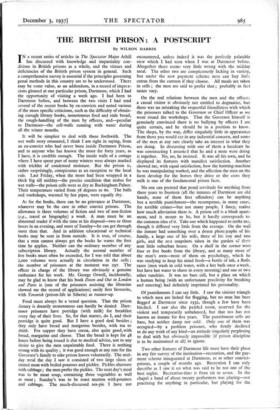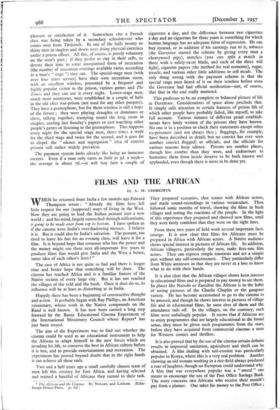THE BRITISH PRISON : A POSTSCRIPT
By WILSON HARRIS
IN a recent series of articles in The Spectator Major Athill has discussed with knowledge and impartiality con- ditions in British prisons as a whole, and the virtues and deficiencies of the British prison system in general. Such a comprehensive survey is essential if the principles governing penal methods in this country are to be understood. There may be some value, as an addendum, in a record of impres- sions gleaned at one particular prison, Dartmoor, which I had the opportunity of visiting a week ago. I had been to Dartmoor before, and between the two visits I had read several of the recent books by ex-convicts and noted various of the more specific criticisms, such as the difficulty of obtain- ing enough library books, monotonous food and stale bread, the rough-handling of the men by officers, and—peculiar to Dartmoor—the cell-walls running with water during all the winter months.
It will be simplest to deal with these forthwith. The wet walls story emanated, I think I am right in saying, from an ex-convict who had never been inside Dartmoor Prison, and to anyone who has known the moor for forty years, as I have, it is credible enough. The inside walls of a cottage where I have spent part of many winters were always marked with trickles of condensed moisture. But the prison is, rather surprisingly, conspicuous as an exception to the local rule. Last Friday, when the moor had been wrapped in a thick fog till midday—the precise condition that makes for wet walls—the prison cells were as dry as Buckingham Palace. Their temperature varied from 58 degrees to 6o. The balls and workshops, warmed by hot pipes, were equally dry.
As for the books, there can be no grievance at Dartmoor, whatever may be the case in other convict prisons. The allowance is three volumes of fiction and two of non-fiction (e.g., travel or biography) a week. A man must be an abnormal reader if with the time at his disposal—two or three hours in an evening, and most of Sunday—he can get through more than that. And in addition educational or technical books may be sent in from outside. It is true, of course, that a man cannot always get the books he wants the first time he applies. Neither can the ordinary member of any subscription library. Actually the normal number of five books must often be exceeded, for I was told that about 2,000 volumes were actually in circulation in the cells ; the number of prisoners at the moment was 297. The officer in charge of the library was obviously a genuine enthusiast for his work. Mr. George Orwell, incidentally, may be glad to know that his book Down and Out in London and Paris is (one of the prisoners assisting the librarian showed me the record of applications) easily first favourite, with Tovarish (prison-life in Siberia) as runner-up.
Food must always be a vexed question. That the prison dietary is drearily monotonous can hardly be denied. Dart- moor prisoners have porridge (with milk) for breakfast every day of their lives. So, for that matter, do I, and their porridge is quite good. But I have a good deal besides ; they only have bread and margarine besides, with tea to drink. For supper they have cocoa, also quite good, with bread, margarine and cheese. That the bread is kept for 48 hours before being issued is due to medical advice, not to any desire to give the men unpalatable food. There is nothing wrong with its quality ; it was good enough at any rate for the Governor's family to take prison loaves voluntarily. The mid- day meal the day I saw it consisted of two large slices of tinned meat with boiled potatoes and pickles. Pickles alternate with cabbage; the men prefer the pickles. The next day's meal was to be meat soup, containing three vegetables as well as meat ; Sunday's was to be roast mutton with potatoes and cabbage. The much-discussed sea-pie I have not encountered, unless indeed it was the perfectly palatable stew which I had seen when I was at Dartmoor before. Altogether there seems very little wrong with the midday meal. The other two are conspicuously lacking in variety, but under the new payment scheme men can buy little extras from the canteen if they choose. All meals are taken in cells ; the men are said to prefer that ; probably in fact tastes vary.
On the real relations between the men and the officers a casual visitor is obviously not entitled to dogmatise, but there was no mistaking the respectful friendliness with which the prisoners talked to the Governor or Chief Officer as we went round the workshops. That the Governor himself is genuinely convinced there is no bullying by officers I am quite certain, and he should be in a position to know. The shops, by the way, differ singularly little in appearance from those you would see in any industrial concern, and some of the men at any rate clearly take an interest in what they are doing. In discussing with one of them a handcart he was constructing I assumed that he and a mate were doing it together. No, no, he insisted. It was all his own, and he displayed its features with manifest satisfaction. Another showed me, with equal satisfaction, how the knitting-machine he was manipulating worked, and the affection the men on the farm develop for the horses they drive or the cows they milk is one of the fundamental prison facts.
No one can pretend that penal servitude for anything from three years to fourteen (all the inmates of Dartmoor are old hands, none of them first offenders) can be anything but a terrible punishment—the recompense, in many cases, for terrible crimes—but not many people, I fancy, realise how much alleviation there is. A prison cell is a bleak apart- ment, and is meant to be, but it hardly corresponds to the common idea of it. Take one which happened to strike me, though it differed very little from the average. On the wall the inmate had something over a dozen photographs of his family, a large one of his wife, three of his boy and two girls, and the rest snapshots taken in the garden of the jr neat little suburban house. On a shelf in the corner were four or five books from the library, and as many more of the man's own—most of them on psychology, which he was studying to keep his mind fresh—a bottle of ink, a Rolls razor (men wash in cold water, with a hot bath once a week, but have hot water to shave in every morning) and one or two other sundries. It was no bare cell, but a place on which a human being (with an unfortunate proclivity for breaking and entering) had definitely imprinted his personality.
Of punishments I can say little. I saw the sinister triangle to which men are lashed for flogging, but no man has been flogged at Dartmoor since 1932, though a few have been birched. I saw also the padded room, reserved for the violent and temporarily unbalanced, but that too has not known an inmate for five years. The punishment cells are bare, but neither damp nor cold. Only one of them was occupied—by a problem prisoner, who firmly declined to do any work of any kind—an attitude singularly perplexing to deal with but obviously impossible (if prison discipline is to be maintained at all) to ignore.
Two other features of Dartmoor life must have their place in any fair survey of the institution—recreation, and the pay- ment scheme inaugurated at Dartmoor, as at other convict- prisons, a couple of months ago. Recreation I can only describe as I saw it on what was said to be not one of the best nights. Recreation-time is from six to seven. In the chapel a band of about twenty performers was playing—not practising for anything in particular, but playing for the pleasure or satisfaction of it. Somewhere else a French class was being taken by a secondary schoolmaster who comes over from Tavistock. In one of the halls twenty or thirty men in singlets and shorts were doing physical exercises under a prison officer. All this, of course, is purely voluntary on the men's part ; if they prefer to stay in their cells, or devote their time to some unorganised form of recreation (the number of recreation evenings available varies according to a man's " stage ") they can. The special-stage men (with over four years service) have their own recreation room, with an excellent wireless, presented by a frequent and highly popular visitor to the prison, various games and The Times, and they can use it every night. Lower-stage men, much more numerous, were established in a couple of halls in the old 1812 war-prison (not used for any other purpose). They have a gramophone, but for them wireless is still a hope of the future ; they were playing draughts or dominoes or chess, talking together, tramping round the long room in couples, reading last Sunday's papers or just watching other people's games or listening to the gramophone. This happens every night for the special stage men, three times a week for the third stage and twice for the second, and it goes far to dispel the " silence and segregation " idea of convict prisons still, rather widely prevalent.
The payment system looks already like being an immense success. Even if a man only earns as little as 3d. a week— the average is about 7d.—it will buy him a couple of cigarettes a day, and the difference between two cigarettes a day and no cigarettes for three years is something for which human language has no adequate form of expression. He can buy instead, or in addition if his earnings run to it, tobacco (the Governor started the scheme by giving every man a cherrywood pipe), matches (you can split a match in three with a safety-razor blade, and each of the three will light), cigarette papers (the method for real economy), sugar, treacle, and various other little additions to cell meals. The only thing wrong with the payment scheme is that the special stage men heard of it on their wireless before even the Governor had had official notification—not, of course, that that in the end really mattered.
This professes to be no complete or balanced picture of life at Dartmoor. Considerations of space alone preclude that. It simply calls attention to certain features of prison life of which other people have probably failed, like myself, to take full account. Various inmates of different penal establish- ments have lately written of the prisons they have known. No one is in a position to check their statements except other exTprisoners (and not always they ; floggings, for example, have been described 'in detail, but no convict has ever seen another convict flogged) or officials, and the officials for various reasons keep silence. Prisons are sombre places, though less sombre than they were, and endeavours to humanise them from inside deserve to be both known and applauded, even though there is more to be done yet,



























































 Previous page
Previous page